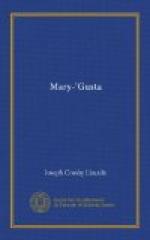She did not answer that letter. After much deliberation she fought down the temptation and decided not to do so. What was the use? If one wished to forget, or wished someone else to forget, if it was a real wish and not merely pretending, the way to bring about that result was to do nothing to cause remembrance. Letters, even the letters of friends, the most platonic letters, were reminders. She had begged for Crawford’s friendship—she could not bring herself to let him go without hearing that he forgave her and would think of her as a friend—but now she vowed she would not be so silly and childish as to torture him or herself unnecessarily. She would not do it. And so she did not write.
After Christmas came the long, dull winter. It was the most discouraging season the silent partner of Hamilton and Company had yet put in in her capacity as manager. There were no cottagers to help out with their custom, very few new customers, no fresh faces in the store, the same dreary, deadly round from morning till night. She tried her hardest and, with the able assistance of Sim Crocker who was proving himself a treasure, did succeed in making February’s sales larger than January’s and those of March larger than either. But she looked forward to April and the real spring with impatience. She had a plan for the spring.
It was in March that she experienced a great satisfaction and gave Shadrach the surprise and delight of his life by collecting the firm’s bill against Mr. Jeremiah Clifford. Mr. Clifford, it will be remembered, had owed Hamilton and Company one hundred and ten dollars for a long time. There was every indication that he was perfectly satisfied with the arrangement and intended to owe it forever. Mary had written, had called upon him repeatedly, had even journeyed to Ostable and consulted her friend Judge Baxter. The Judge had promised to look into the matter and he did so, but his letter to her contained little that was hopeful.
There is money there [wrote the Judge]. The man Clifford appears to be in very comfortable circumstances, but he is a shrewd [there were indications here that the word “rascal” had been written and then erased] person and, so far as I can learn, there is not a single item of property, real or otherwise, that is in his own name. If there were, we might attach that property for your debt, but we cannot attach Mrs. Clifford’s holdings. All I can advise is to discontinue selling him more goods and to worry him all you can about the old bill. He may grow tired of being dunned and pay, if not all, at least something on account.
When Mary read this portion of the letter to her Uncle Shadrach his scorn was outspoken.




